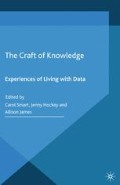Abstract
Historians spend a lot of their time with the dead. Most of the data we use for description and analysis of past phenomena is derived from the written words and material artefacts of the dead and gone. If we work with oral history methods, or with the words and documentation of living subjects, what we write about them gets incorporated in existing historical argument and narration; in this way, we make the living speak the many dialogues of the dead. History-writing makes the already-dead to speak and walk amongst us. This was a very early proclamation of the new, modern, professional, university-based history that emerged in the long European nineteenth century. In 1869 Jules Michelet announced the raising of the dead in writing as the proper task of the historian. He was remembering back to his first days in the Archives Nationales in Paris, early in the century. Walking through the ‘catacombs of manuscripts’, he had discerned ‘a movement and murmur which were not those of death. These papers and parchments, so long deserted, desired no better than to be restored to the light of day’. It was 1833 when he addressed, not bundles of documents, but the dead themselves, telling them how and in what manner they should emerge from their tombs: ‘Softly my dear friends, let us proceed in order if you please’. He recalled that as he ‘breathed their dust, I saw them rise up.
[T]his wavering yet determinate social structure, or what we could call history. History […] is that ghostly […] totality that articulates and disarticulates itself and the subjects who inhabit it. It is, in contrast to sociology and other modern retrieval enterprises, never available as a final solution for the difficulties haunting creates for the living. It is always a site of struggle between the living and the ghostly, a struggle whose resolution has to remain partial to the living, even when the living can only partially grasp the source of the ghost’s power. (Gordon 2008, 184)
Biology has not yet been able to decide whether death is the inevitable fate of every human being, or whether it is only a regular but yet perhaps avoidable event in life. (Freud 1990, orig. pub. 1919: 364)
Access this chapter
Tax calculation will be finalised at checkout
Purchases are for personal use only
Preview
Unable to display preview. Download preview PDF.
Editor information
Editors and Affiliations
Copyright information
© 2014 Carolyn Steedman
About this chapter
Cite this chapter
Steedman, C. (2014). Living with the Dead. In: Smart, C., Hockey, J., James, A. (eds) The Craft of Knowledge. Palgrave Macmillan, London. https://doi.org/10.1057/9781137287342_10
Download citation
DOI: https://doi.org/10.1057/9781137287342_10
Publisher Name: Palgrave Macmillan, London
Print ISBN: 978-1-349-44966-8
Online ISBN: 978-1-137-28734-2
eBook Packages: Palgrave Business & Management CollectionBusiness and Management (R0)

